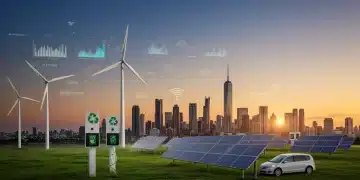DOE announces green hydrogen grants 2025 to boost innovation
DOE announces green hydrogen grants in 2025 to support innovative projects, enhance job creation, and promote environmental sustainability in the renewable energy sector.
DOE announces green hydrogen grants 2025, aimed at catalyzing advancements in the energy sector. These grants could unlock significant opportunities for innovation and sustainability. Have you considered how this might affect our energy landscape?
Understanding the importance of green hydrogen
Understanding the importance of green hydrogen is crucial as we progress towards a more sustainable energy future. It serves as a clean energy carrier, helping to transition from fossil fuels to renewable resources.
Environmental Benefits
The production of green hydrogen utilizes renewable energy sources, such as wind and solar, which significantly reduces carbon emissions. By replacing traditional hydrogen production methods, we can:
- Minimize greenhouse gas emissions
- Reduce dependence on fossil fuels
- Contribute to climate change mitigation
Switching to green hydrogen not only aids the environment but also enhances energy security. With this clean energy source, countries can diversify their energy portfolio and reduce vulnerability to global fuel price fluctuations.
Technological Advancements
Innovations in the production process of green hydrogen are advancing rapidly. Using electrolyzers powered by renewable energy, we can efficiently produce hydrogen from water. This technology is improving continuously, leading to:
- Increased efficiency of hydrogen production
- Lower production costs
- Wider adoption in various industries
The future of green hydrogen appears promising as it becomes more feasible and accessible. Industries like transportation and manufacturing are eagerly exploring its potential. As businesses invest in this technology, we can expect a significant shift towards cleaner practices.
Key eligibility criteria for grants

When applying for DOE grants, understanding the key eligibility criteria is essential. These guidelines help determine who can receive funding and for what purposes.
Basic Requirements
First, applicants must be a registered organization. This can include non-profits, educational institutions, or businesses. Additionally, the project must focus on green hydrogen technology and demonstrate its potential benefits to the economy and environment.
Specific Criteria
It is also crucial to meet specific benchmarks set by the DOE. These criteria may include:
- Evidence of prior experience in related projects.
- A detailed plan outlining the project’s goals and execution steps.
- Proof of potential partnerships with other organizations or industries.
Furthermore, having a sustainable approach towards green hydrogen development can enhance the application’s chance. Projects should showcase innovative solutions and long-term impacts on energy sustainability.
Financial Obligations
Understanding financial obligations is another aspect of eligibility. Applicants need to demonstrate they can match a portion of the funding. This can come from various sources, reinforcing the project’s viability.
Ultimately, meeting these key eligibility criteria sets a solid foundation for a successful grant application. As the push for renewable energy grows, being well-prepared can enhance opportunities for funding and support.
How to apply for DOE hydrogen grants
Applying for DOE hydrogen grants requires a clear understanding of the process. It can seem daunting, but breaking it down into manageable steps can make it easier.
Preparation Steps
First, ensure that your project aligns with the goals of the DOE. This means focusing on advancements in green hydrogen technologies. Gather relevant documents and create a strong proposal that highlights your project’s potential.
Proposal Submission
Once your preparation is complete, you can start the proposal submission. Follow these guidelines:
- Register on the DOE website and create an account.
- Fill out the required application forms accurately.
- Attach all necessary supporting documents, including budget plans and project timelines.
Each section of the application should clearly express how your project will contribute to the field of green hydrogen. A well-organized application is crucial for catching the review committee’s attention.
Review and Follow-Up
After submission, maintain communication with the DOE. They may reach out for additional information or clarifications. Be prepared to respond quickly to enhance your chances of success. Regularly check for updates regarding your application status.
Ultimately, knowing how to navigate the application process for DOE hydrogen grants can position you for funding. This support can significantly help in advancing your projects within the energy sector.
Impact of grants on renewable energy projects

The impact of grants on renewable energy projects, especially in the realm of green hydrogen, cannot be overstated. These funding opportunities play a crucial role in accelerating innovation and development.
Stimulating Research and Development
Grants enable researchers and companies to explore new technologies without the burden of financial constraints. This support leads to:
- Increased investment in innovative solutions.
- Faster prototyping and testing of new ideas.
- Collaboration between academia and industry.
Through grants, many projects can transition from concepts to real-world applications. This rapid deployment is essential for creating a sustainable future.
Job Creation and Economic Growth
Investing in renewable energy through grants promotes job creation. New projects often require skilled workforce, resulting in positions such as engineers, scientists, and technicians. These jobs contribute to local economies, enhancing overall growth.
Moreover, successful projects can attract further investments, boosting economic activity in regions focused on green hydrogen and renewable technologies.
Enhancing Environmental Benefits
The ultimate goal of these grants is to foster environmental sustainability. With financial support, projects contribute to:
- Reducing carbon emissions
- Improving energy efficiency
- Supporting the transition to cleaner energy sources
By facilitating the growth of renewable energy initiatives, grants help combat climate change and promote a healthier planet.
FAQ – Questions about DOE Hydrogen Grants and their Impact
What are DOE hydrogen grants?
DOE hydrogen grants are funding opportunities provided by the Department of Energy to support projects focusing on green hydrogen technologies.
How can I apply for these grants?
To apply, register on the DOE website, complete the application forms, and submit a detailed project proposal that meets eligibility criteria.
What impact do these grants have on renewable energy?
These grants significantly boost innovation, create jobs, and promote projects that enhance environmental sustainability.
Who is eligible to apply for DOE hydrogen grants?
Eligibility typically includes non-profits, educational institutions, and businesses working on projects related to green hydrogen.





